International Relations Theories Analysis
VerifiedAdded on 2020/04/01
|13
|3218
|164
AI Summary
This assignment requires a comprehensive analysis of various international relations theories. Students must examine classical perspectives like Realism and Liberalism, as well as newer approaches such as Constructivism and Marxism. The task involves understanding the fundamental concepts, strengths, weaknesses, and real-world applications of each theory. The bibliography provided offers valuable sources for research and analysis.
Contribute Materials
Your contribution can guide someone’s learning journey. Share your
documents today.
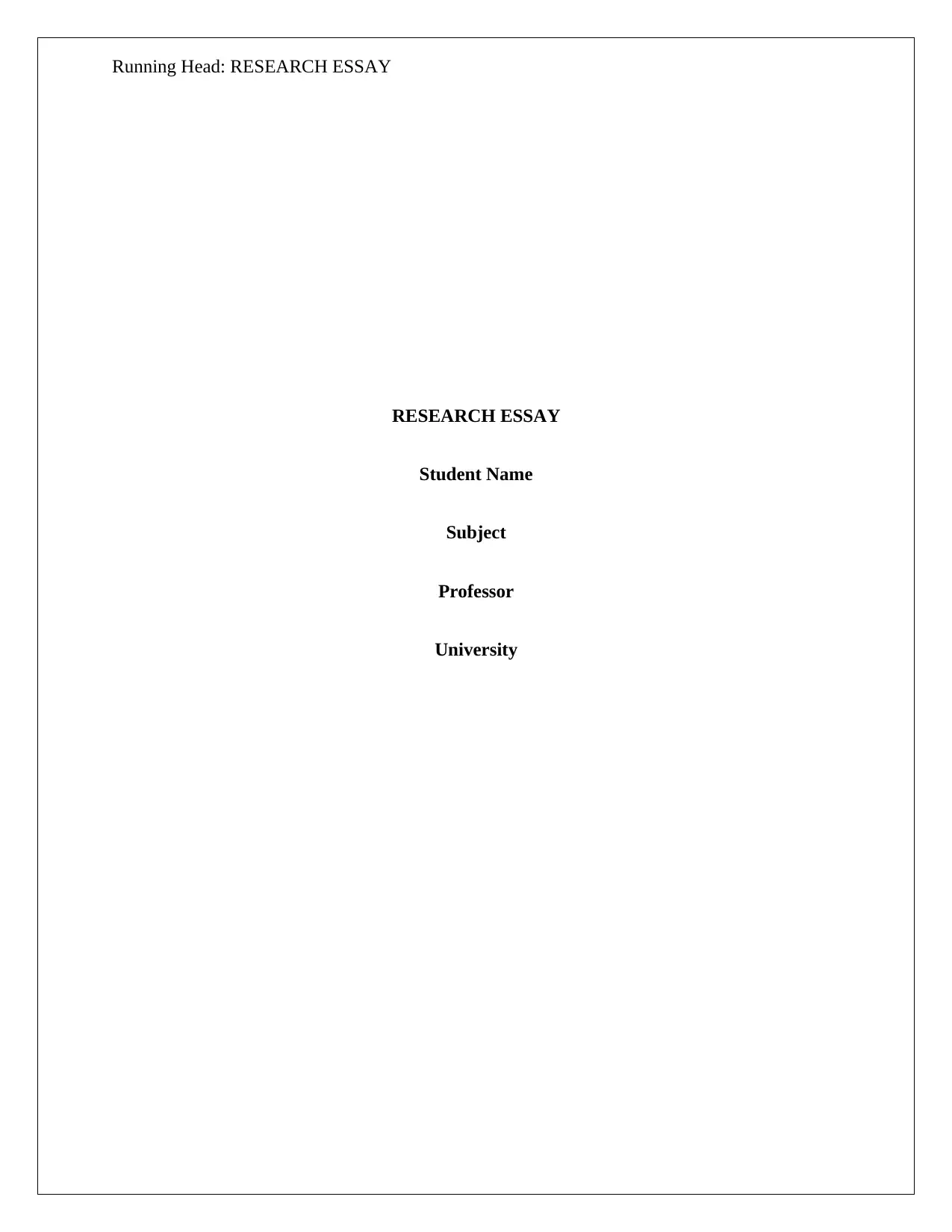
Running Head: RESEARCH ESSAY
RESEARCH ESSAY
Student Name
Subject
Professor
University
RESEARCH ESSAY
Student Name
Subject
Professor
University
Secure Best Marks with AI Grader
Need help grading? Try our AI Grader for instant feedback on your assignments.
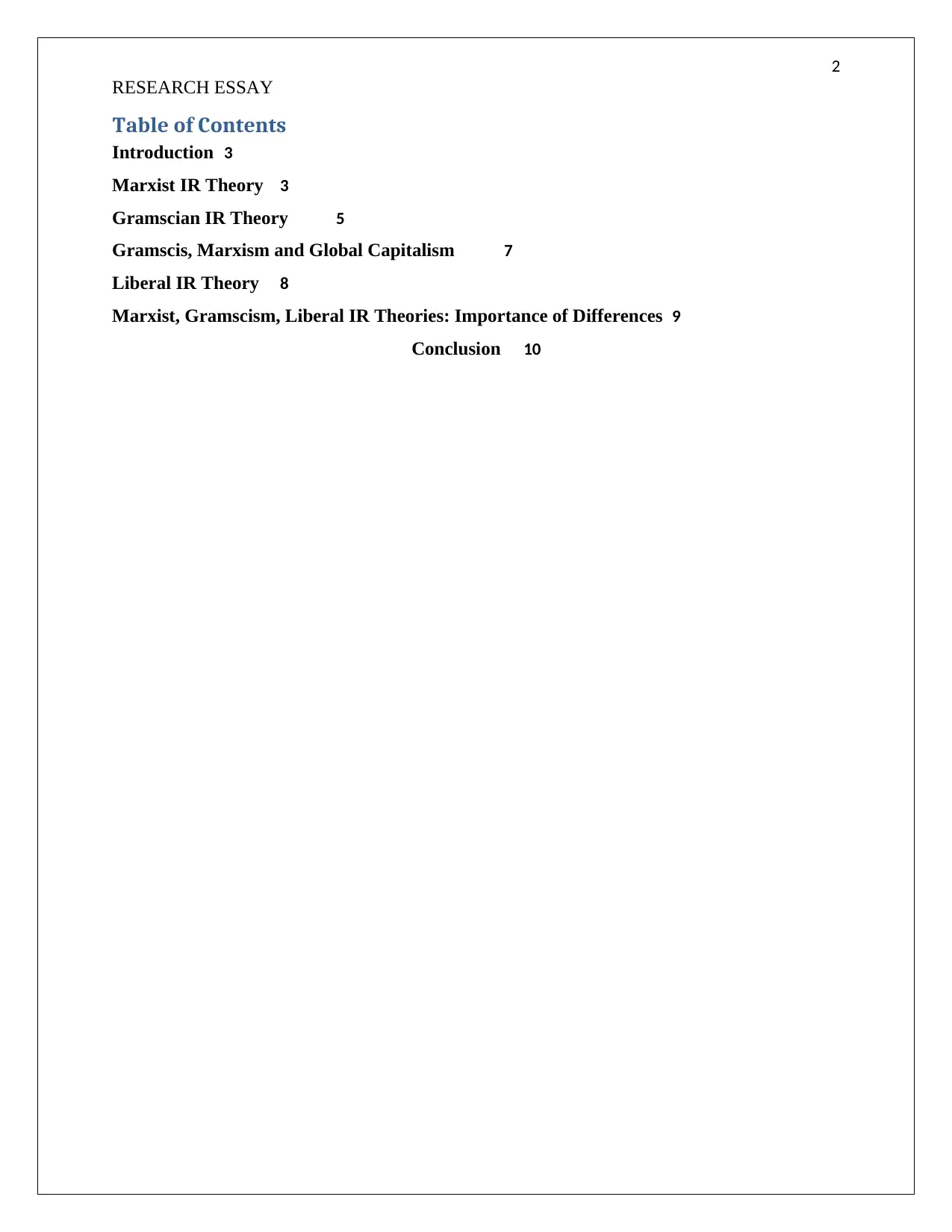
2
RESEARCH ESSAY
Table of Contents
Introduction 3
Marxist IR Theory 3
Gramscian IR Theory 5
Gramscis, Marxism and Global Capitalism 7
Liberal IR Theory 8
Marxist, Gramscism, Liberal IR Theories: Importance of Differences 9
Conclusion 10
RESEARCH ESSAY
Table of Contents
Introduction 3
Marxist IR Theory 3
Gramscian IR Theory 5
Gramscis, Marxism and Global Capitalism 7
Liberal IR Theory 8
Marxist, Gramscism, Liberal IR Theories: Importance of Differences 9
Conclusion 10
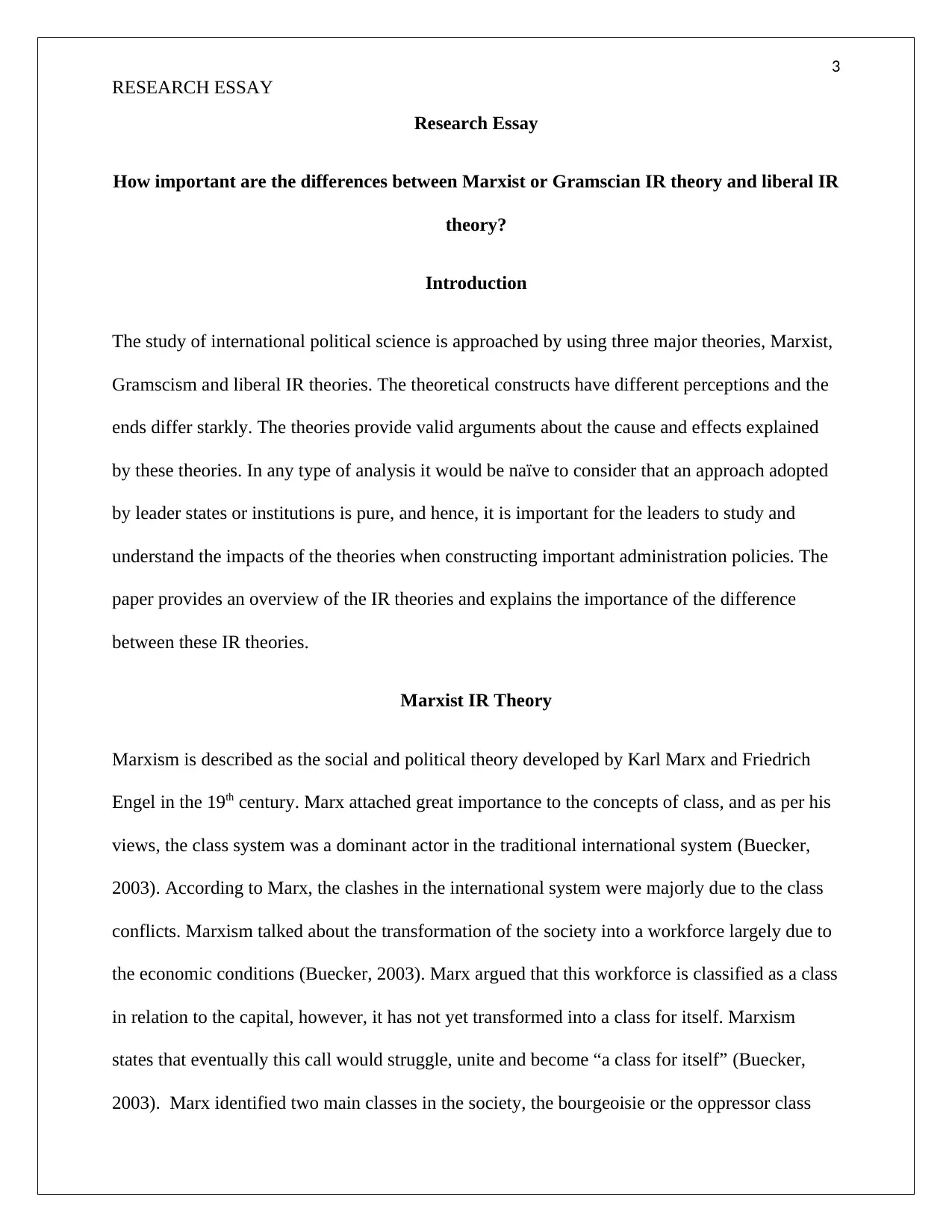
3
RESEARCH ESSAY
Research Essay
How important are the differences between Marxist or Gramscian IR theory and liberal IR
theory?
Introduction
The study of international political science is approached by using three major theories, Marxist,
Gramscism and liberal IR theories. The theoretical constructs have different perceptions and the
ends differ starkly. The theories provide valid arguments about the cause and effects explained
by these theories. In any type of analysis it would be naïve to consider that an approach adopted
by leader states or institutions is pure, and hence, it is important for the leaders to study and
understand the impacts of the theories when constructing important administration policies. The
paper provides an overview of the IR theories and explains the importance of the difference
between these IR theories.
Marxist IR Theory
Marxism is described as the social and political theory developed by Karl Marx and Friedrich
Engel in the 19th century. Marx attached great importance to the concepts of class, and as per his
views, the class system was a dominant actor in the traditional international system (Buecker,
2003). According to Marx, the clashes in the international system were majorly due to the class
conflicts. Marxism talked about the transformation of the society into a workforce largely due to
the economic conditions (Buecker, 2003). Marx argued that this workforce is classified as a class
in relation to the capital, however, it has not yet transformed into a class for itself. Marxism
states that eventually this call would struggle, unite and become “a class for itself” (Buecker,
2003). Marx identified two main classes in the society, the bourgeoisie or the oppressor class
RESEARCH ESSAY
Research Essay
How important are the differences between Marxist or Gramscian IR theory and liberal IR
theory?
Introduction
The study of international political science is approached by using three major theories, Marxist,
Gramscism and liberal IR theories. The theoretical constructs have different perceptions and the
ends differ starkly. The theories provide valid arguments about the cause and effects explained
by these theories. In any type of analysis it would be naïve to consider that an approach adopted
by leader states or institutions is pure, and hence, it is important for the leaders to study and
understand the impacts of the theories when constructing important administration policies. The
paper provides an overview of the IR theories and explains the importance of the difference
between these IR theories.
Marxist IR Theory
Marxism is described as the social and political theory developed by Karl Marx and Friedrich
Engel in the 19th century. Marx attached great importance to the concepts of class, and as per his
views, the class system was a dominant actor in the traditional international system (Buecker,
2003). According to Marx, the clashes in the international system were majorly due to the class
conflicts. Marxism talked about the transformation of the society into a workforce largely due to
the economic conditions (Buecker, 2003). Marx argued that this workforce is classified as a class
in relation to the capital, however, it has not yet transformed into a class for itself. Marxism
states that eventually this call would struggle, unite and become “a class for itself” (Buecker,
2003). Marx identified two main classes in the society, the bourgeoisie or the oppressor class
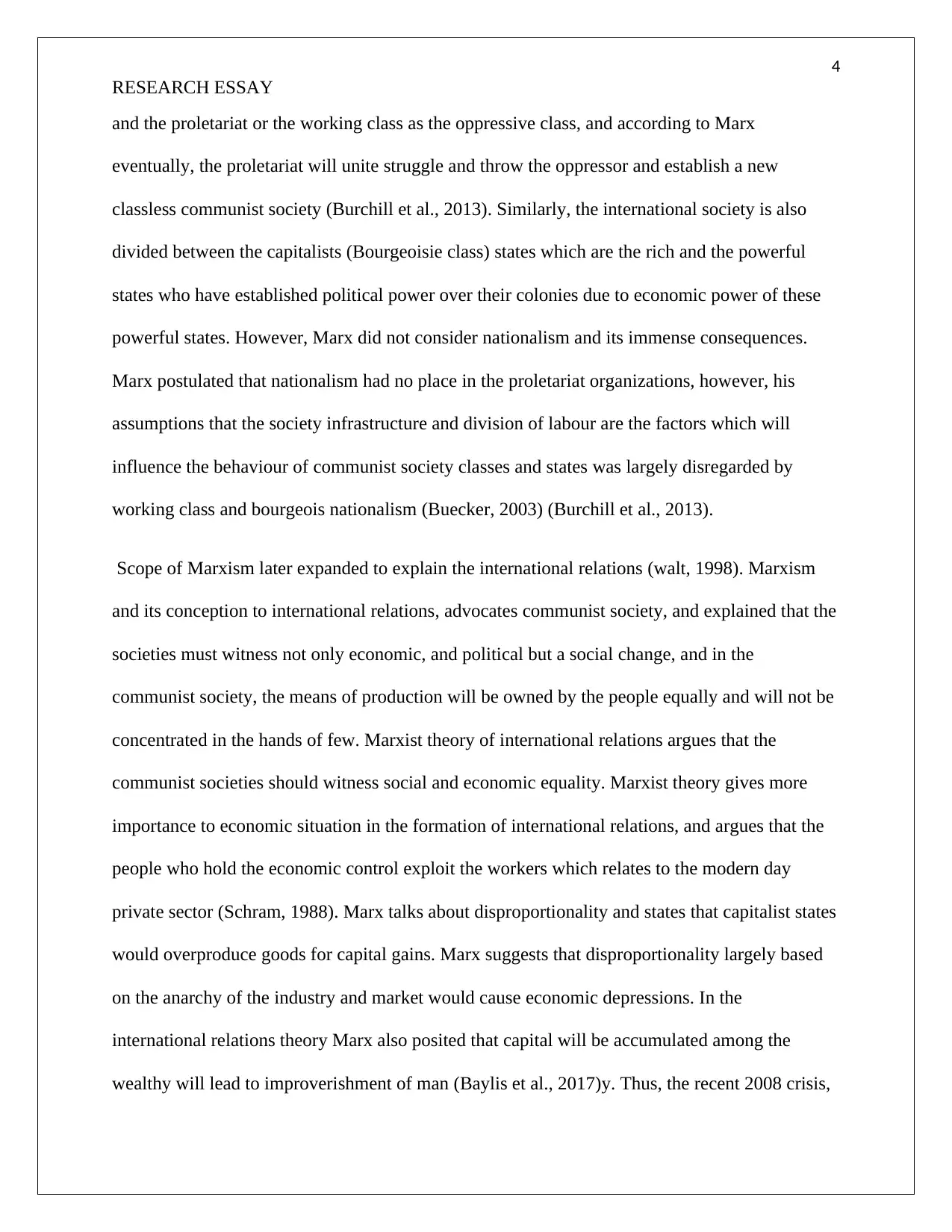
4
RESEARCH ESSAY
and the proletariat or the working class as the oppressive class, and according to Marx
eventually, the proletariat will unite struggle and throw the oppressor and establish a new
classless communist society (Burchill et al., 2013). Similarly, the international society is also
divided between the capitalists (Bourgeoisie class) states which are the rich and the powerful
states who have established political power over their colonies due to economic power of these
powerful states. However, Marx did not consider nationalism and its immense consequences.
Marx postulated that nationalism had no place in the proletariat organizations, however, his
assumptions that the society infrastructure and division of labour are the factors which will
influence the behaviour of communist society classes and states was largely disregarded by
working class and bourgeois nationalism (Buecker, 2003) (Burchill et al., 2013).
Scope of Marxism later expanded to explain the international relations (walt, 1998). Marxism
and its conception to international relations, advocates communist society, and explained that the
societies must witness not only economic, and political but a social change, and in the
communist society, the means of production will be owned by the people equally and will not be
concentrated in the hands of few. Marxist theory of international relations argues that the
communist societies should witness social and economic equality. Marxist theory gives more
importance to economic situation in the formation of international relations, and argues that the
people who hold the economic control exploit the workers which relates to the modern day
private sector (Schram, 1988). Marx talks about disproportionality and states that capitalist states
would overproduce goods for capital gains. Marx suggests that disproportionality largely based
on the anarchy of the industry and market would cause economic depressions. In the
international relations theory Marx also posited that capital will be accumulated among the
wealthy will lead to improverishment of man (Baylis et al., 2017)y. Thus, the recent 2008 crisis,
RESEARCH ESSAY
and the proletariat or the working class as the oppressive class, and according to Marx
eventually, the proletariat will unite struggle and throw the oppressor and establish a new
classless communist society (Burchill et al., 2013). Similarly, the international society is also
divided between the capitalists (Bourgeoisie class) states which are the rich and the powerful
states who have established political power over their colonies due to economic power of these
powerful states. However, Marx did not consider nationalism and its immense consequences.
Marx postulated that nationalism had no place in the proletariat organizations, however, his
assumptions that the society infrastructure and division of labour are the factors which will
influence the behaviour of communist society classes and states was largely disregarded by
working class and bourgeois nationalism (Buecker, 2003) (Burchill et al., 2013).
Scope of Marxism later expanded to explain the international relations (walt, 1998). Marxism
and its conception to international relations, advocates communist society, and explained that the
societies must witness not only economic, and political but a social change, and in the
communist society, the means of production will be owned by the people equally and will not be
concentrated in the hands of few. Marxist theory of international relations argues that the
communist societies should witness social and economic equality. Marxist theory gives more
importance to economic situation in the formation of international relations, and argues that the
people who hold the economic control exploit the workers which relates to the modern day
private sector (Schram, 1988). Marx talks about disproportionality and states that capitalist states
would overproduce goods for capital gains. Marx suggests that disproportionality largely based
on the anarchy of the industry and market would cause economic depressions. In the
international relations theory Marx also posited that capital will be accumulated among the
wealthy will lead to improverishment of man (Baylis et al., 2017)y. Thus, the recent 2008 crisis,
Secure Best Marks with AI Grader
Need help grading? Try our AI Grader for instant feedback on your assignments.
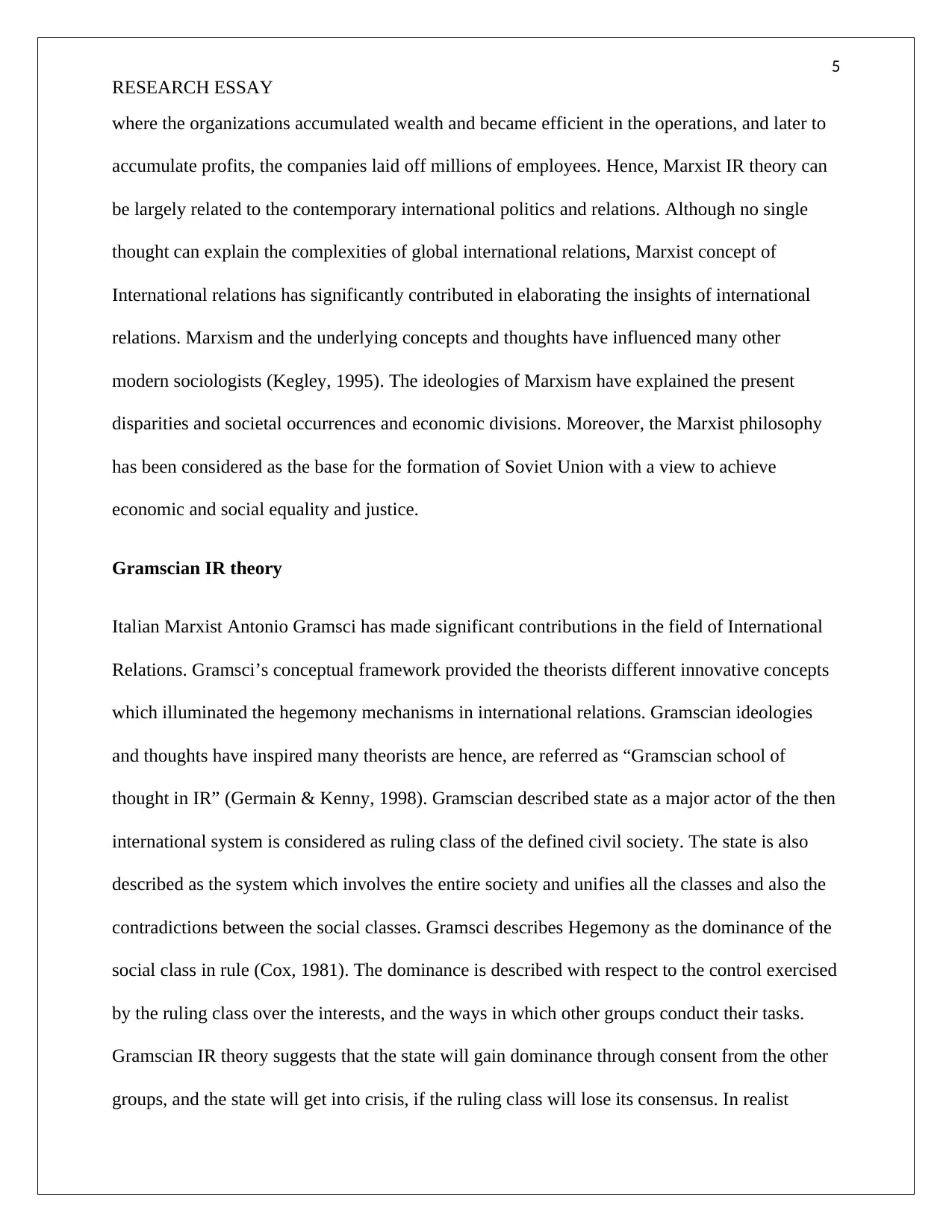
5
RESEARCH ESSAY
where the organizations accumulated wealth and became efficient in the operations, and later to
accumulate profits, the companies laid off millions of employees. Hence, Marxist IR theory can
be largely related to the contemporary international politics and relations. Although no single
thought can explain the complexities of global international relations, Marxist concept of
International relations has significantly contributed in elaborating the insights of international
relations. Marxism and the underlying concepts and thoughts have influenced many other
modern sociologists (Kegley, 1995). The ideologies of Marxism have explained the present
disparities and societal occurrences and economic divisions. Moreover, the Marxist philosophy
has been considered as the base for the formation of Soviet Union with a view to achieve
economic and social equality and justice.
Gramscian IR theory
Italian Marxist Antonio Gramsci has made significant contributions in the field of International
Relations. Gramsci’s conceptual framework provided the theorists different innovative concepts
which illuminated the hegemony mechanisms in international relations. Gramscian ideologies
and thoughts have inspired many theorists are hence, are referred as “Gramscian school of
thought in IR” (Germain & Kenny, 1998). Gramscian described state as a major actor of the then
international system is considered as ruling class of the defined civil society. The state is also
described as the system which involves the entire society and unifies all the classes and also the
contradictions between the social classes. Gramsci describes Hegemony as the dominance of the
social class in rule (Cox, 1981). The dominance is described with respect to the control exercised
by the ruling class over the interests, and the ways in which other groups conduct their tasks.
Gramscian IR theory suggests that the state will gain dominance through consent from the other
groups, and the state will get into crisis, if the ruling class will lose its consensus. In realist
RESEARCH ESSAY
where the organizations accumulated wealth and became efficient in the operations, and later to
accumulate profits, the companies laid off millions of employees. Hence, Marxist IR theory can
be largely related to the contemporary international politics and relations. Although no single
thought can explain the complexities of global international relations, Marxist concept of
International relations has significantly contributed in elaborating the insights of international
relations. Marxism and the underlying concepts and thoughts have influenced many other
modern sociologists (Kegley, 1995). The ideologies of Marxism have explained the present
disparities and societal occurrences and economic divisions. Moreover, the Marxist philosophy
has been considered as the base for the formation of Soviet Union with a view to achieve
economic and social equality and justice.
Gramscian IR theory
Italian Marxist Antonio Gramsci has made significant contributions in the field of International
Relations. Gramsci’s conceptual framework provided the theorists different innovative concepts
which illuminated the hegemony mechanisms in international relations. Gramscian ideologies
and thoughts have inspired many theorists are hence, are referred as “Gramscian school of
thought in IR” (Germain & Kenny, 1998). Gramscian described state as a major actor of the then
international system is considered as ruling class of the defined civil society. The state is also
described as the system which involves the entire society and unifies all the classes and also the
contradictions between the social classes. Gramsci describes Hegemony as the dominance of the
social class in rule (Cox, 1981). The dominance is described with respect to the control exercised
by the ruling class over the interests, and the ways in which other groups conduct their tasks.
Gramscian IR theory suggests that the state will gain dominance through consent from the other
groups, and the state will get into crisis, if the ruling class will lose its consensus. In realist
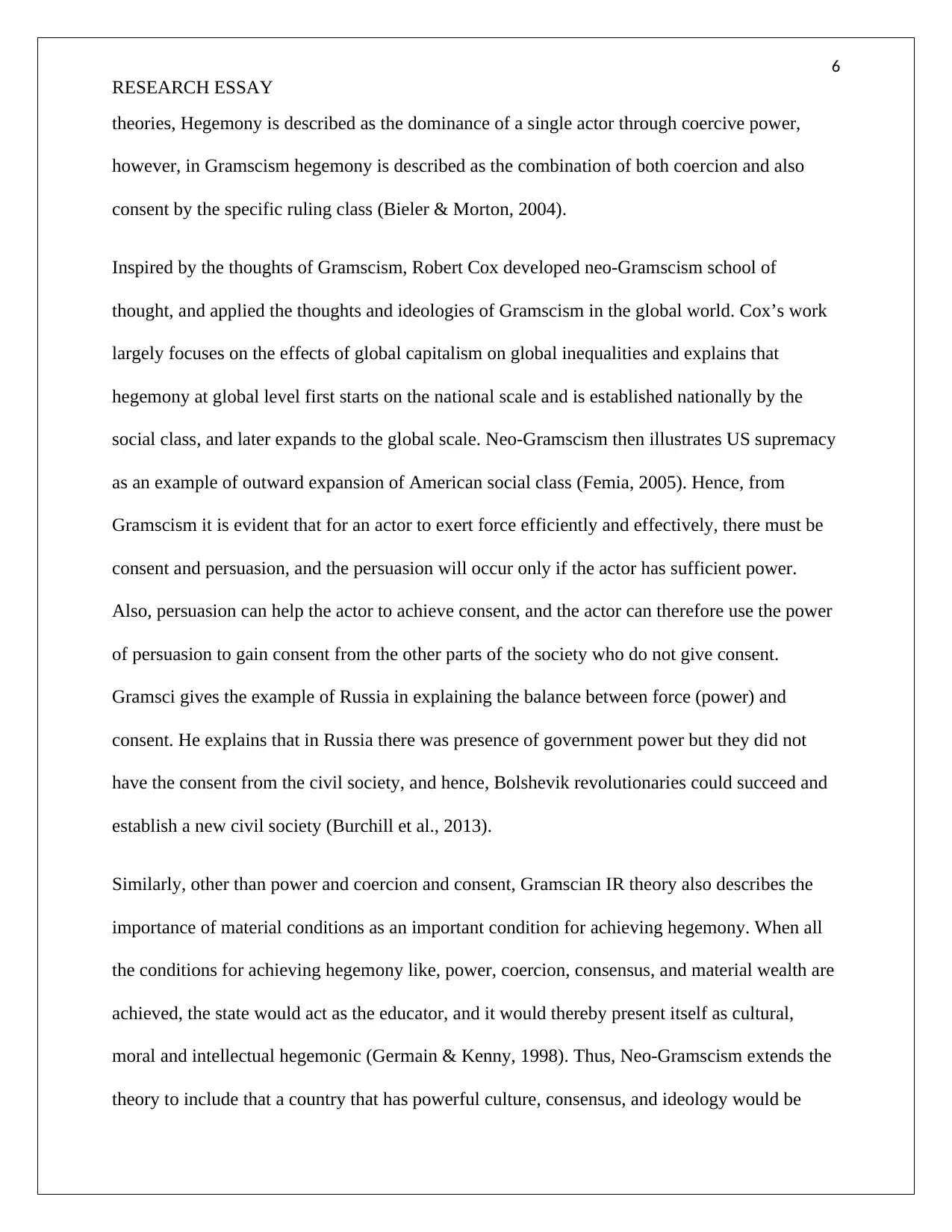
6
RESEARCH ESSAY
theories, Hegemony is described as the dominance of a single actor through coercive power,
however, in Gramscism hegemony is described as the combination of both coercion and also
consent by the specific ruling class (Bieler & Morton, 2004).
Inspired by the thoughts of Gramscism, Robert Cox developed neo-Gramscism school of
thought, and applied the thoughts and ideologies of Gramscism in the global world. Cox’s work
largely focuses on the effects of global capitalism on global inequalities and explains that
hegemony at global level first starts on the national scale and is established nationally by the
social class, and later expands to the global scale. Neo-Gramscism then illustrates US supremacy
as an example of outward expansion of American social class (Femia, 2005). Hence, from
Gramscism it is evident that for an actor to exert force efficiently and effectively, there must be
consent and persuasion, and the persuasion will occur only if the actor has sufficient power.
Also, persuasion can help the actor to achieve consent, and the actor can therefore use the power
of persuasion to gain consent from the other parts of the society who do not give consent.
Gramsci gives the example of Russia in explaining the balance between force (power) and
consent. He explains that in Russia there was presence of government power but they did not
have the consent from the civil society, and hence, Bolshevik revolutionaries could succeed and
establish a new civil society (Burchill et al., 2013).
Similarly, other than power and coercion and consent, Gramscian IR theory also describes the
importance of material conditions as an important condition for achieving hegemony. When all
the conditions for achieving hegemony like, power, coercion, consensus, and material wealth are
achieved, the state would act as the educator, and it would thereby present itself as cultural,
moral and intellectual hegemonic (Germain & Kenny, 1998). Thus, Neo-Gramscism extends the
theory to include that a country that has powerful culture, consensus, and ideology would be
RESEARCH ESSAY
theories, Hegemony is described as the dominance of a single actor through coercive power,
however, in Gramscism hegemony is described as the combination of both coercion and also
consent by the specific ruling class (Bieler & Morton, 2004).
Inspired by the thoughts of Gramscism, Robert Cox developed neo-Gramscism school of
thought, and applied the thoughts and ideologies of Gramscism in the global world. Cox’s work
largely focuses on the effects of global capitalism on global inequalities and explains that
hegemony at global level first starts on the national scale and is established nationally by the
social class, and later expands to the global scale. Neo-Gramscism then illustrates US supremacy
as an example of outward expansion of American social class (Femia, 2005). Hence, from
Gramscism it is evident that for an actor to exert force efficiently and effectively, there must be
consent and persuasion, and the persuasion will occur only if the actor has sufficient power.
Also, persuasion can help the actor to achieve consent, and the actor can therefore use the power
of persuasion to gain consent from the other parts of the society who do not give consent.
Gramsci gives the example of Russia in explaining the balance between force (power) and
consent. He explains that in Russia there was presence of government power but they did not
have the consent from the civil society, and hence, Bolshevik revolutionaries could succeed and
establish a new civil society (Burchill et al., 2013).
Similarly, other than power and coercion and consent, Gramscian IR theory also describes the
importance of material conditions as an important condition for achieving hegemony. When all
the conditions for achieving hegemony like, power, coercion, consensus, and material wealth are
achieved, the state would act as the educator, and it would thereby present itself as cultural,
moral and intellectual hegemonic (Germain & Kenny, 1998). Thus, Neo-Gramscism extends the
theory to include that a country that has powerful culture, consensus, and ideology would be
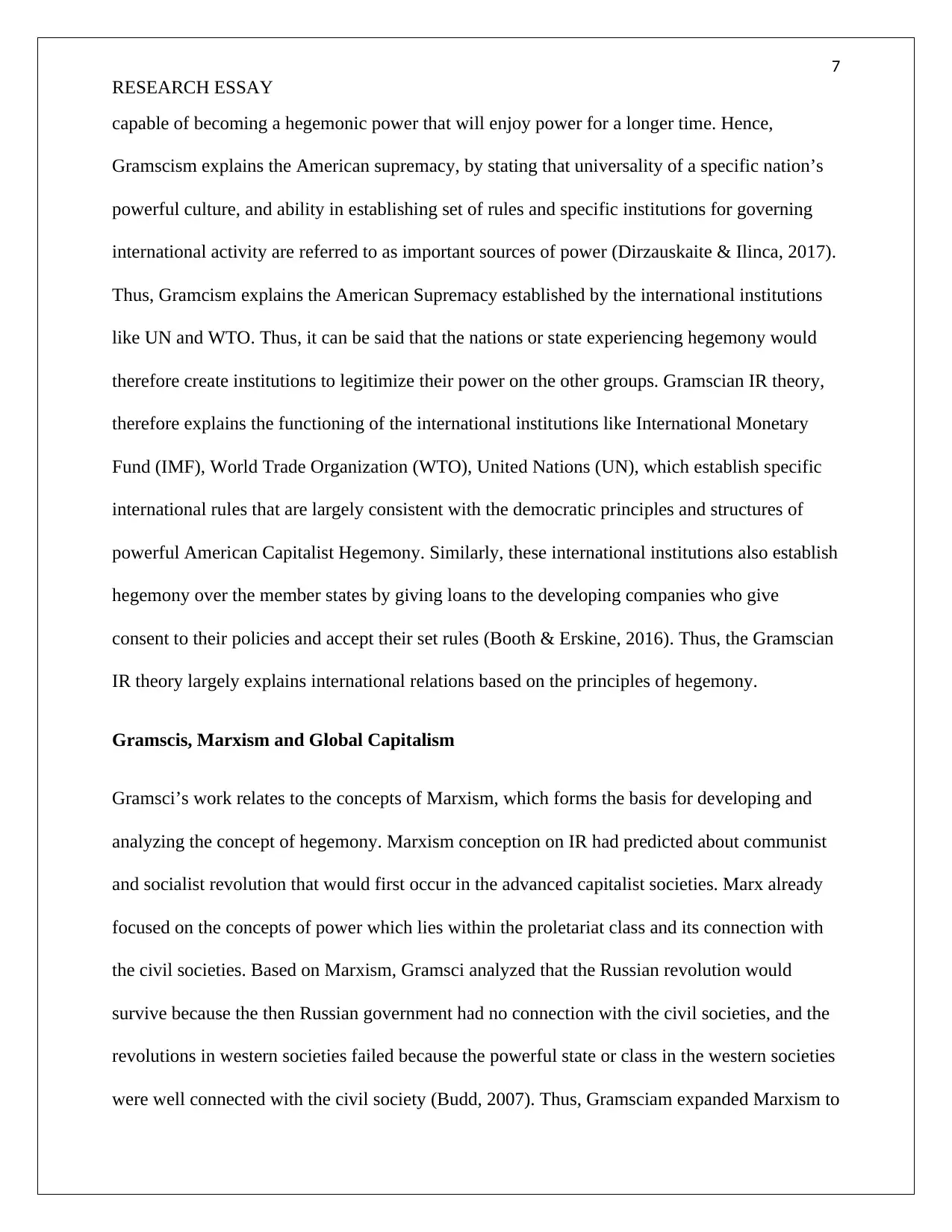
7
RESEARCH ESSAY
capable of becoming a hegemonic power that will enjoy power for a longer time. Hence,
Gramscism explains the American supremacy, by stating that universality of a specific nation’s
powerful culture, and ability in establishing set of rules and specific institutions for governing
international activity are referred to as important sources of power (Dirzauskaite & Ilinca, 2017).
Thus, Gramcism explains the American Supremacy established by the international institutions
like UN and WTO. Thus, it can be said that the nations or state experiencing hegemony would
therefore create institutions to legitimize their power on the other groups. Gramscian IR theory,
therefore explains the functioning of the international institutions like International Monetary
Fund (IMF), World Trade Organization (WTO), United Nations (UN), which establish specific
international rules that are largely consistent with the democratic principles and structures of
powerful American Capitalist Hegemony. Similarly, these international institutions also establish
hegemony over the member states by giving loans to the developing companies who give
consent to their policies and accept their set rules (Booth & Erskine, 2016). Thus, the Gramscian
IR theory largely explains international relations based on the principles of hegemony.
Gramscis, Marxism and Global Capitalism
Gramsci’s work relates to the concepts of Marxism, which forms the basis for developing and
analyzing the concept of hegemony. Marxism conception on IR had predicted about communist
and socialist revolution that would first occur in the advanced capitalist societies. Marx already
focused on the concepts of power which lies within the proletariat class and its connection with
the civil societies. Based on Marxism, Gramsci analyzed that the Russian revolution would
survive because the then Russian government had no connection with the civil societies, and the
revolutions in western societies failed because the powerful state or class in the western societies
were well connected with the civil society (Budd, 2007). Thus, Gramsciam expanded Marxism to
RESEARCH ESSAY
capable of becoming a hegemonic power that will enjoy power for a longer time. Hence,
Gramscism explains the American supremacy, by stating that universality of a specific nation’s
powerful culture, and ability in establishing set of rules and specific institutions for governing
international activity are referred to as important sources of power (Dirzauskaite & Ilinca, 2017).
Thus, Gramcism explains the American Supremacy established by the international institutions
like UN and WTO. Thus, it can be said that the nations or state experiencing hegemony would
therefore create institutions to legitimize their power on the other groups. Gramscian IR theory,
therefore explains the functioning of the international institutions like International Monetary
Fund (IMF), World Trade Organization (WTO), United Nations (UN), which establish specific
international rules that are largely consistent with the democratic principles and structures of
powerful American Capitalist Hegemony. Similarly, these international institutions also establish
hegemony over the member states by giving loans to the developing companies who give
consent to their policies and accept their set rules (Booth & Erskine, 2016). Thus, the Gramscian
IR theory largely explains international relations based on the principles of hegemony.
Gramscis, Marxism and Global Capitalism
Gramsci’s work relates to the concepts of Marxism, which forms the basis for developing and
analyzing the concept of hegemony. Marxism conception on IR had predicted about communist
and socialist revolution that would first occur in the advanced capitalist societies. Marx already
focused on the concepts of power which lies within the proletariat class and its connection with
the civil societies. Based on Marxism, Gramsci analyzed that the Russian revolution would
survive because the then Russian government had no connection with the civil societies, and the
revolutions in western societies failed because the powerful state or class in the western societies
were well connected with the civil society (Budd, 2007). Thus, Gramsciam expanded Marxism to
Paraphrase This Document
Need a fresh take? Get an instant paraphrase of this document with our AI Paraphraser
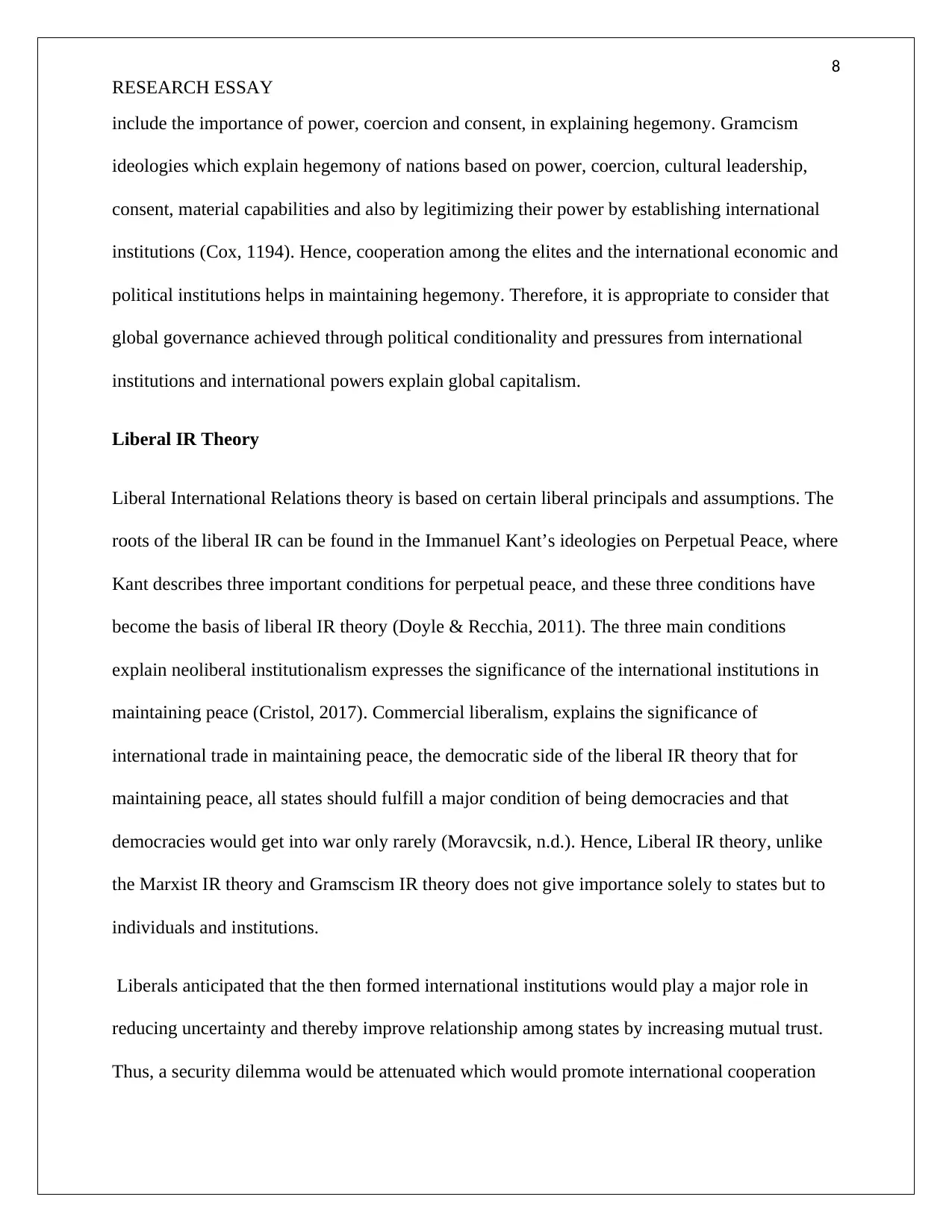
8
RESEARCH ESSAY
include the importance of power, coercion and consent, in explaining hegemony. Gramcism
ideologies which explain hegemony of nations based on power, coercion, cultural leadership,
consent, material capabilities and also by legitimizing their power by establishing international
institutions (Cox, 1194). Hence, cooperation among the elites and the international economic and
political institutions helps in maintaining hegemony. Therefore, it is appropriate to consider that
global governance achieved through political conditionality and pressures from international
institutions and international powers explain global capitalism.
Liberal IR Theory
Liberal International Relations theory is based on certain liberal principals and assumptions. The
roots of the liberal IR can be found in the Immanuel Kant’s ideologies on Perpetual Peace, where
Kant describes three important conditions for perpetual peace, and these three conditions have
become the basis of liberal IR theory (Doyle & Recchia, 2011). The three main conditions
explain neoliberal institutionalism expresses the significance of the international institutions in
maintaining peace (Cristol, 2017). Commercial liberalism, explains the significance of
international trade in maintaining peace, the democratic side of the liberal IR theory that for
maintaining peace, all states should fulfill a major condition of being democracies and that
democracies would get into war only rarely (Moravcsik, n.d.). Hence, Liberal IR theory, unlike
the Marxist IR theory and Gramscism IR theory does not give importance solely to states but to
individuals and institutions.
Liberals anticipated that the then formed international institutions would play a major role in
reducing uncertainty and thereby improve relationship among states by increasing mutual trust.
Thus, a security dilemma would be attenuated which would promote international cooperation
RESEARCH ESSAY
include the importance of power, coercion and consent, in explaining hegemony. Gramcism
ideologies which explain hegemony of nations based on power, coercion, cultural leadership,
consent, material capabilities and also by legitimizing their power by establishing international
institutions (Cox, 1194). Hence, cooperation among the elites and the international economic and
political institutions helps in maintaining hegemony. Therefore, it is appropriate to consider that
global governance achieved through political conditionality and pressures from international
institutions and international powers explain global capitalism.
Liberal IR Theory
Liberal International Relations theory is based on certain liberal principals and assumptions. The
roots of the liberal IR can be found in the Immanuel Kant’s ideologies on Perpetual Peace, where
Kant describes three important conditions for perpetual peace, and these three conditions have
become the basis of liberal IR theory (Doyle & Recchia, 2011). The three main conditions
explain neoliberal institutionalism expresses the significance of the international institutions in
maintaining peace (Cristol, 2017). Commercial liberalism, explains the significance of
international trade in maintaining peace, the democratic side of the liberal IR theory that for
maintaining peace, all states should fulfill a major condition of being democracies and that
democracies would get into war only rarely (Moravcsik, n.d.). Hence, Liberal IR theory, unlike
the Marxist IR theory and Gramscism IR theory does not give importance solely to states but to
individuals and institutions.
Liberals anticipated that the then formed international institutions would play a major role in
reducing uncertainty and thereby improve relationship among states by increasing mutual trust.
Thus, a security dilemma would be attenuated which would promote international cooperation
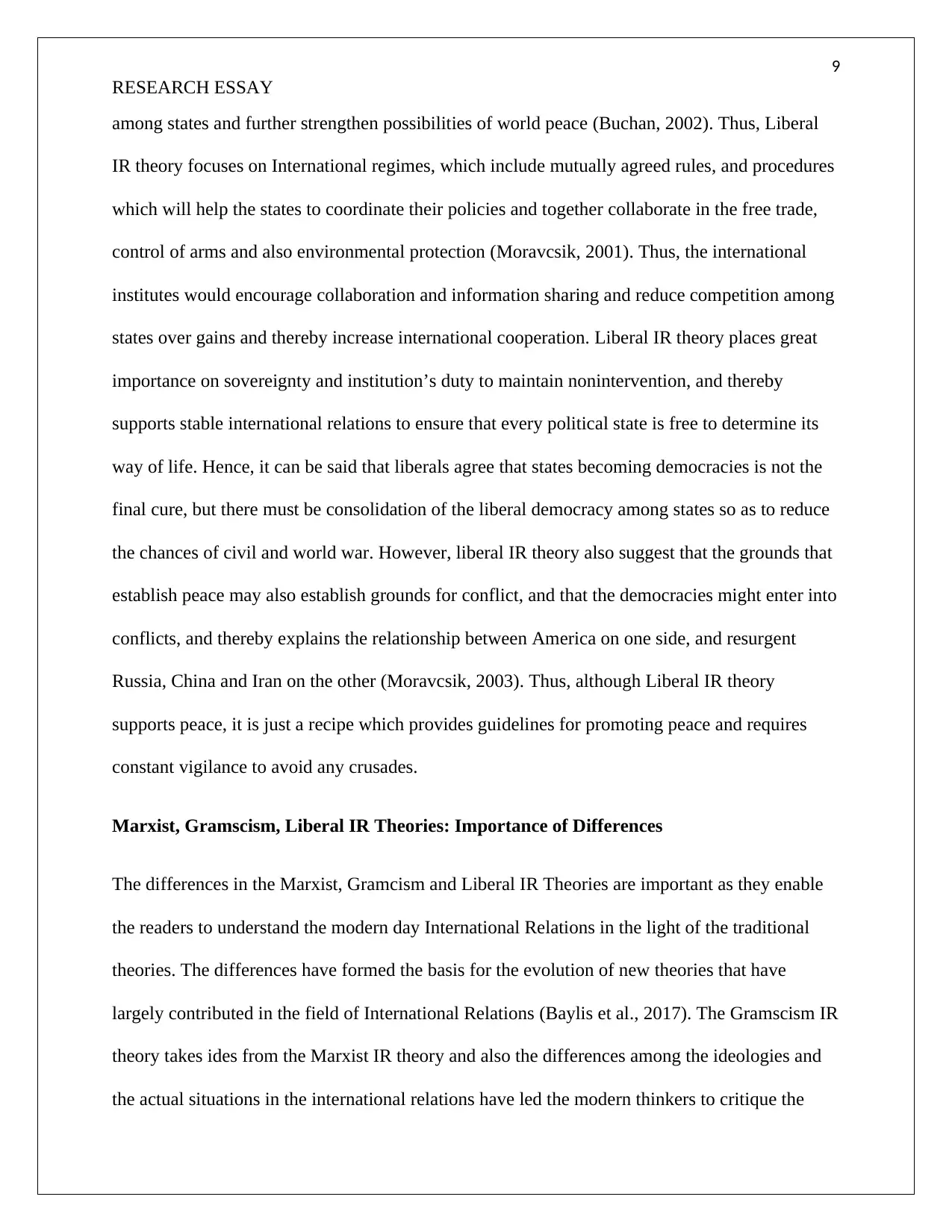
9
RESEARCH ESSAY
among states and further strengthen possibilities of world peace (Buchan, 2002). Thus, Liberal
IR theory focuses on International regimes, which include mutually agreed rules, and procedures
which will help the states to coordinate their policies and together collaborate in the free trade,
control of arms and also environmental protection (Moravcsik, 2001). Thus, the international
institutes would encourage collaboration and information sharing and reduce competition among
states over gains and thereby increase international cooperation. Liberal IR theory places great
importance on sovereignty and institution’s duty to maintain nonintervention, and thereby
supports stable international relations to ensure that every political state is free to determine its
way of life. Hence, it can be said that liberals agree that states becoming democracies is not the
final cure, but there must be consolidation of the liberal democracy among states so as to reduce
the chances of civil and world war. However, liberal IR theory also suggest that the grounds that
establish peace may also establish grounds for conflict, and that the democracies might enter into
conflicts, and thereby explains the relationship between America on one side, and resurgent
Russia, China and Iran on the other (Moravcsik, 2003). Thus, although Liberal IR theory
supports peace, it is just a recipe which provides guidelines for promoting peace and requires
constant vigilance to avoid any crusades.
Marxist, Gramscism, Liberal IR Theories: Importance of Differences
The differences in the Marxist, Gramcism and Liberal IR Theories are important as they enable
the readers to understand the modern day International Relations in the light of the traditional
theories. The differences have formed the basis for the evolution of new theories that have
largely contributed in the field of International Relations (Baylis et al., 2017). The Gramscism IR
theory takes ides from the Marxist IR theory and also the differences among the ideologies and
the actual situations in the international relations have led the modern thinkers to critique the
RESEARCH ESSAY
among states and further strengthen possibilities of world peace (Buchan, 2002). Thus, Liberal
IR theory focuses on International regimes, which include mutually agreed rules, and procedures
which will help the states to coordinate their policies and together collaborate in the free trade,
control of arms and also environmental protection (Moravcsik, 2001). Thus, the international
institutes would encourage collaboration and information sharing and reduce competition among
states over gains and thereby increase international cooperation. Liberal IR theory places great
importance on sovereignty and institution’s duty to maintain nonintervention, and thereby
supports stable international relations to ensure that every political state is free to determine its
way of life. Hence, it can be said that liberals agree that states becoming democracies is not the
final cure, but there must be consolidation of the liberal democracy among states so as to reduce
the chances of civil and world war. However, liberal IR theory also suggest that the grounds that
establish peace may also establish grounds for conflict, and that the democracies might enter into
conflicts, and thereby explains the relationship between America on one side, and resurgent
Russia, China and Iran on the other (Moravcsik, 2003). Thus, although Liberal IR theory
supports peace, it is just a recipe which provides guidelines for promoting peace and requires
constant vigilance to avoid any crusades.
Marxist, Gramscism, Liberal IR Theories: Importance of Differences
The differences in the Marxist, Gramcism and Liberal IR Theories are important as they enable
the readers to understand the modern day International Relations in the light of the traditional
theories. The differences have formed the basis for the evolution of new theories that have
largely contributed in the field of International Relations (Baylis et al., 2017). The Gramscism IR
theory takes ides from the Marxist IR theory and also the differences among the ideologies and
the actual situations in the international relations have led the modern thinkers to critique the
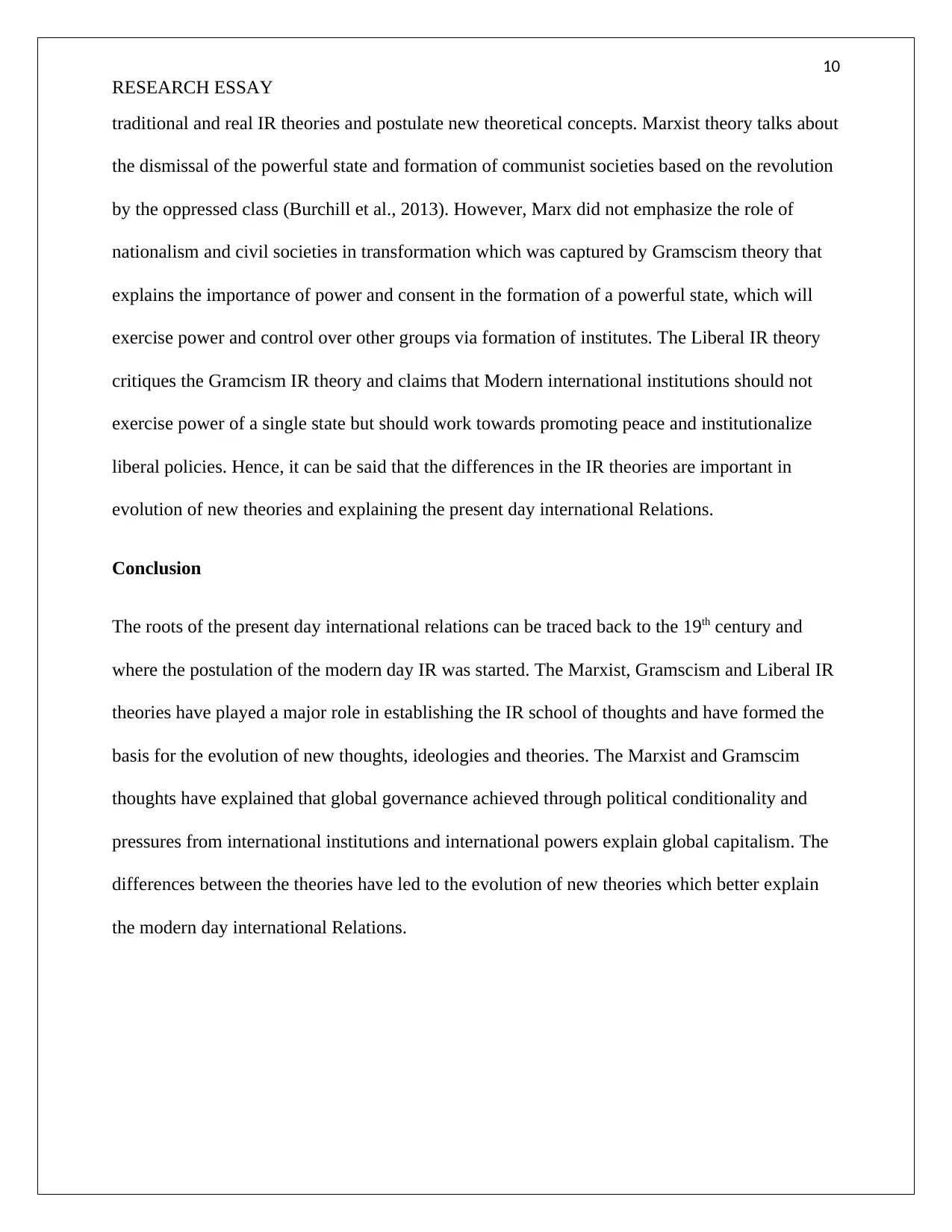
10
RESEARCH ESSAY
traditional and real IR theories and postulate new theoretical concepts. Marxist theory talks about
the dismissal of the powerful state and formation of communist societies based on the revolution
by the oppressed class (Burchill et al., 2013). However, Marx did not emphasize the role of
nationalism and civil societies in transformation which was captured by Gramscism theory that
explains the importance of power and consent in the formation of a powerful state, which will
exercise power and control over other groups via formation of institutes. The Liberal IR theory
critiques the Gramcism IR theory and claims that Modern international institutions should not
exercise power of a single state but should work towards promoting peace and institutionalize
liberal policies. Hence, it can be said that the differences in the IR theories are important in
evolution of new theories and explaining the present day international Relations.
Conclusion
The roots of the present day international relations can be traced back to the 19th century and
where the postulation of the modern day IR was started. The Marxist, Gramscism and Liberal IR
theories have played a major role in establishing the IR school of thoughts and have formed the
basis for the evolution of new thoughts, ideologies and theories. The Marxist and Gramscim
thoughts have explained that global governance achieved through political conditionality and
pressures from international institutions and international powers explain global capitalism. The
differences between the theories have led to the evolution of new theories which better explain
the modern day international Relations.
RESEARCH ESSAY
traditional and real IR theories and postulate new theoretical concepts. Marxist theory talks about
the dismissal of the powerful state and formation of communist societies based on the revolution
by the oppressed class (Burchill et al., 2013). However, Marx did not emphasize the role of
nationalism and civil societies in transformation which was captured by Gramscism theory that
explains the importance of power and consent in the formation of a powerful state, which will
exercise power and control over other groups via formation of institutes. The Liberal IR theory
critiques the Gramcism IR theory and claims that Modern international institutions should not
exercise power of a single state but should work towards promoting peace and institutionalize
liberal policies. Hence, it can be said that the differences in the IR theories are important in
evolution of new theories and explaining the present day international Relations.
Conclusion
The roots of the present day international relations can be traced back to the 19th century and
where the postulation of the modern day IR was started. The Marxist, Gramscism and Liberal IR
theories have played a major role in establishing the IR school of thoughts and have formed the
basis for the evolution of new thoughts, ideologies and theories. The Marxist and Gramscim
thoughts have explained that global governance achieved through political conditionality and
pressures from international institutions and international powers explain global capitalism. The
differences between the theories have led to the evolution of new theories which better explain
the modern day international Relations.
Secure Best Marks with AI Grader
Need help grading? Try our AI Grader for instant feedback on your assignments.
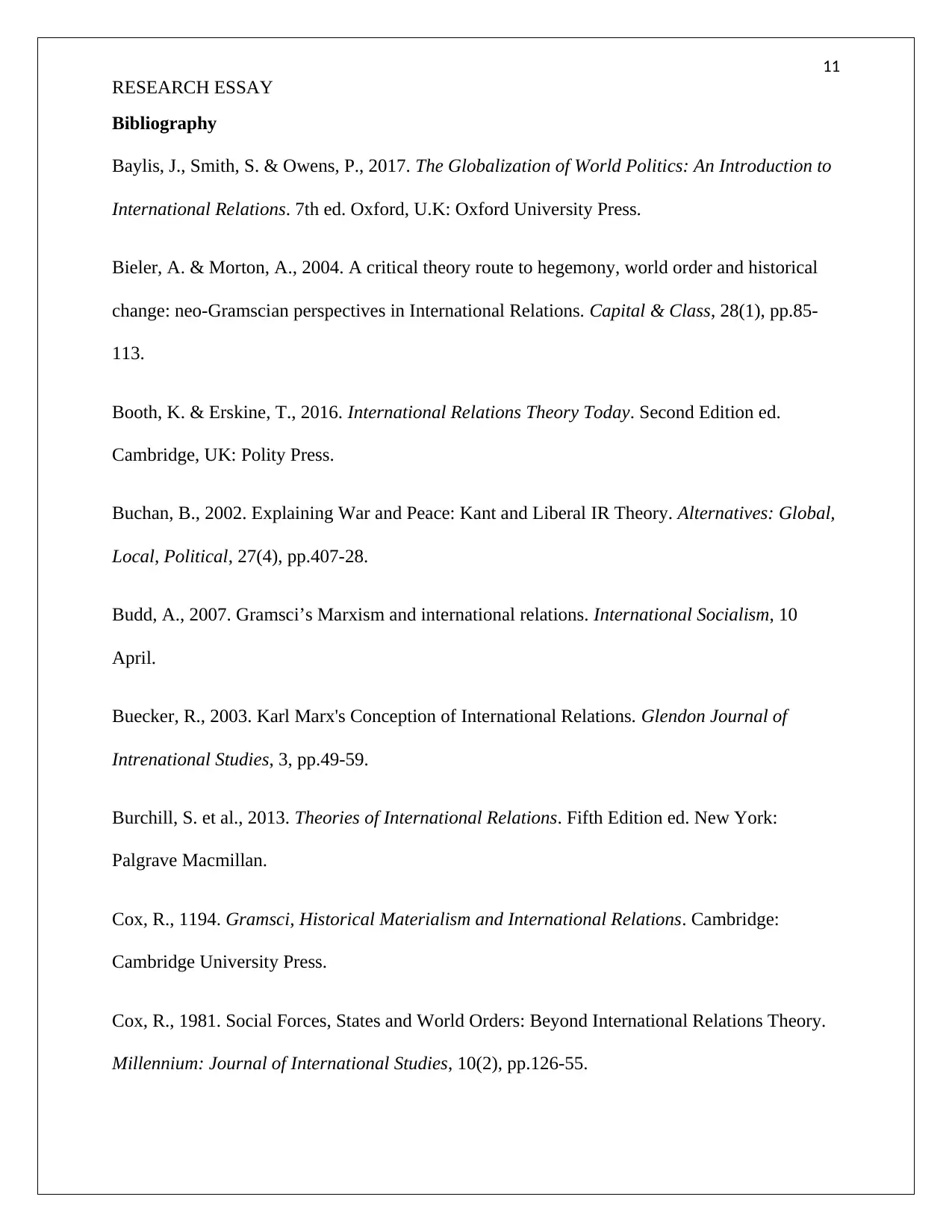
11
RESEARCH ESSAY
Bibliography
Baylis, J., Smith, S. & Owens, P., 2017. The Globalization of World Politics: An Introduction to
International Relations. 7th ed. Oxford, U.K: Oxford University Press.
Bieler, A. & Morton, A., 2004. A critical theory route to hegemony, world order and historical
change: neo-Gramscian perspectives in International Relations. Capital & Class, 28(1), pp.85-
113.
Booth, K. & Erskine, T., 2016. International Relations Theory Today. Second Edition ed.
Cambridge, UK: Polity Press.
Buchan, B., 2002. Explaining War and Peace: Kant and Liberal IR Theory. Alternatives: Global,
Local, Political, 27(4), pp.407-28.
Budd, A., 2007. Gramsci’s Marxism and international relations. International Socialism, 10
April.
Buecker, R., 2003. Karl Marx's Conception of International Relations. Glendon Journal of
Intrenational Studies, 3, pp.49-59.
Burchill, S. et al., 2013. Theories of International Relations. Fifth Edition ed. New York:
Palgrave Macmillan.
Cox, R., 1194. Gramsci, Historical Materialism and International Relations. Cambridge:
Cambridge University Press.
Cox, R., 1981. Social Forces, States and World Orders: Beyond International Relations Theory.
Millennium: Journal of International Studies, 10(2), pp.126-55.
RESEARCH ESSAY
Bibliography
Baylis, J., Smith, S. & Owens, P., 2017. The Globalization of World Politics: An Introduction to
International Relations. 7th ed. Oxford, U.K: Oxford University Press.
Bieler, A. & Morton, A., 2004. A critical theory route to hegemony, world order and historical
change: neo-Gramscian perspectives in International Relations. Capital & Class, 28(1), pp.85-
113.
Booth, K. & Erskine, T., 2016. International Relations Theory Today. Second Edition ed.
Cambridge, UK: Polity Press.
Buchan, B., 2002. Explaining War and Peace: Kant and Liberal IR Theory. Alternatives: Global,
Local, Political, 27(4), pp.407-28.
Budd, A., 2007. Gramsci’s Marxism and international relations. International Socialism, 10
April.
Buecker, R., 2003. Karl Marx's Conception of International Relations. Glendon Journal of
Intrenational Studies, 3, pp.49-59.
Burchill, S. et al., 2013. Theories of International Relations. Fifth Edition ed. New York:
Palgrave Macmillan.
Cox, R., 1194. Gramsci, Historical Materialism and International Relations. Cambridge:
Cambridge University Press.
Cox, R., 1981. Social Forces, States and World Orders: Beyond International Relations Theory.
Millennium: Journal of International Studies, 10(2), pp.126-55.
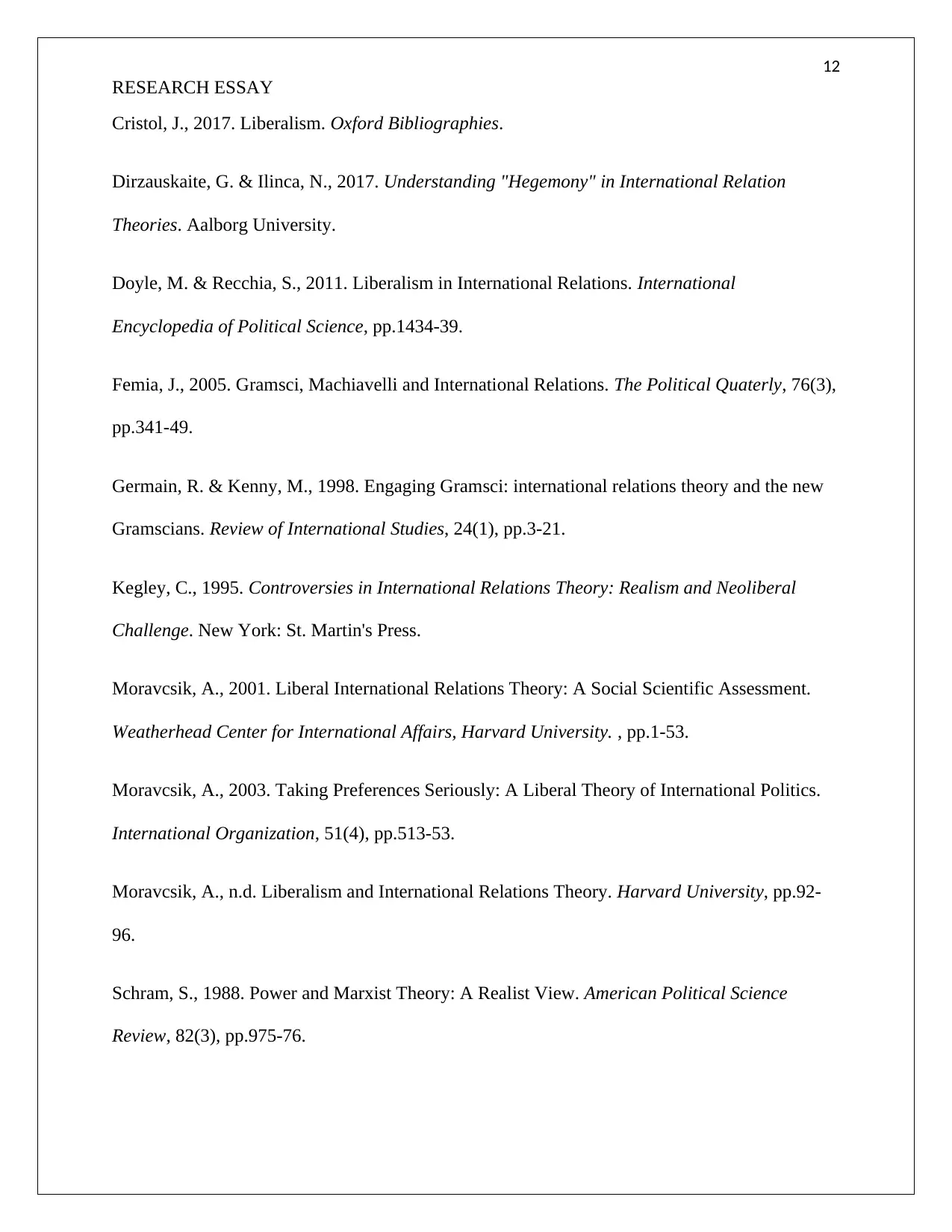
12
RESEARCH ESSAY
Cristol, J., 2017. Liberalism. Oxford Bibliographies.
Dirzauskaite, G. & Ilinca, N., 2017. Understanding "Hegemony" in International Relation
Theories. Aalborg University.
Doyle, M. & Recchia, S., 2011. Liberalism in International Relations. International
Encyclopedia of Political Science, pp.1434-39.
Femia, J., 2005. Gramsci, Machiavelli and International Relations. The Political Quaterly, 76(3),
pp.341-49.
Germain, R. & Kenny, M., 1998. Engaging Gramsci: international relations theory and the new
Gramscians. Review of International Studies, 24(1), pp.3-21.
Kegley, C., 1995. Controversies in International Relations Theory: Realism and Neoliberal
Challenge. New York: St. Martin's Press.
Moravcsik, A., 2001. Liberal International Relations Theory: A Social Scientific Assessment.
Weatherhead Center for International Affairs, Harvard University. , pp.1-53.
Moravcsik, A., 2003. Taking Preferences Seriously: A Liberal Theory of International Politics.
International Organization, 51(4), pp.513-53.
Moravcsik, A., n.d. Liberalism and International Relations Theory. Harvard University, pp.92-
96.
Schram, S., 1988. Power and Marxist Theory: A Realist View. American Political Science
Review, 82(3), pp.975-76.
RESEARCH ESSAY
Cristol, J., 2017. Liberalism. Oxford Bibliographies.
Dirzauskaite, G. & Ilinca, N., 2017. Understanding "Hegemony" in International Relation
Theories. Aalborg University.
Doyle, M. & Recchia, S., 2011. Liberalism in International Relations. International
Encyclopedia of Political Science, pp.1434-39.
Femia, J., 2005. Gramsci, Machiavelli and International Relations. The Political Quaterly, 76(3),
pp.341-49.
Germain, R. & Kenny, M., 1998. Engaging Gramsci: international relations theory and the new
Gramscians. Review of International Studies, 24(1), pp.3-21.
Kegley, C., 1995. Controversies in International Relations Theory: Realism and Neoliberal
Challenge. New York: St. Martin's Press.
Moravcsik, A., 2001. Liberal International Relations Theory: A Social Scientific Assessment.
Weatherhead Center for International Affairs, Harvard University. , pp.1-53.
Moravcsik, A., 2003. Taking Preferences Seriously: A Liberal Theory of International Politics.
International Organization, 51(4), pp.513-53.
Moravcsik, A., n.d. Liberalism and International Relations Theory. Harvard University, pp.92-
96.
Schram, S., 1988. Power and Marxist Theory: A Realist View. American Political Science
Review, 82(3), pp.975-76.
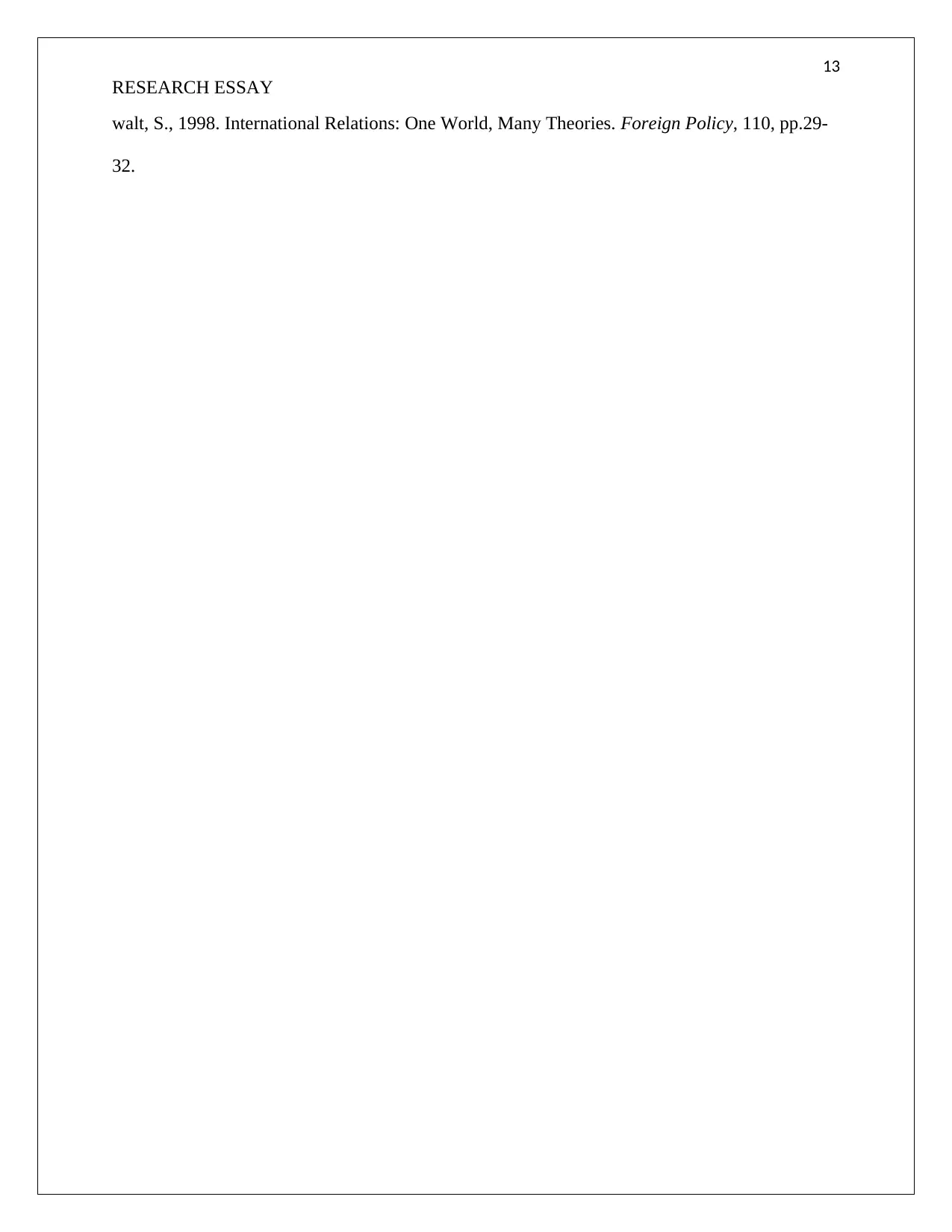
13
RESEARCH ESSAY
walt, S., 1998. International Relations: One World, Many Theories. Foreign Policy, 110, pp.29-
32.
RESEARCH ESSAY
walt, S., 1998. International Relations: One World, Many Theories. Foreign Policy, 110, pp.29-
32.
1 out of 13
Related Documents
Your All-in-One AI-Powered Toolkit for Academic Success.
+13062052269
info@desklib.com
Available 24*7 on WhatsApp / Email
![[object Object]](/_next/static/media/star-bottom.7253800d.svg)
Unlock your academic potential
© 2024 | Zucol Services PVT LTD | All rights reserved.





